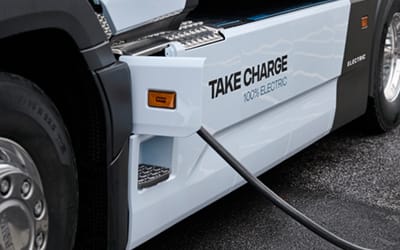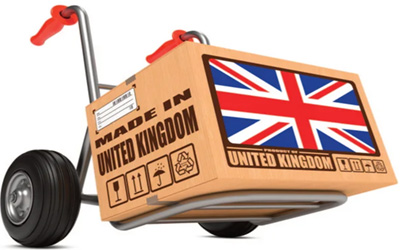Amazon Freight How the E-commerce Giant is Revolutionising Global Logistics
The freight forwarding industry stands at a pivotal crossroads. Amazon Freight’s aggressive expansion throughout 2025 represents more than just another competitor entering the marketplace it signifies a fundamental transformation in how global logistics operates. We’re witnessing the emergence of a new pattern where traditional freight forwarding models face unprecedented challenges from technology-driven, customer centric approaches.
For freight forwarders, particularly those operating in the competitive UK market, understanding Amazon’s strategic moves isn’t merely about keeping tabs on competition. It’s about recognising the seismic shifts that will determine which companies thrive in the next decade and which become obsolete. The question isn’t whether Amazon will impact your business it’s how quickly you can adapt to the new reality they’re creating.
The Amazon Freight Revolution: Understanding the Scale of Disruption
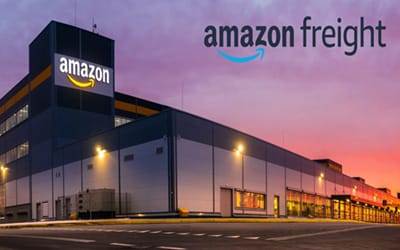 Amazon’s 2025 freight strategy represents a calculated assault on traditional logistics models. We’re not discussing incremental improvements or minor service additions. Amazon is systematically dismantling the barriers that have protected traditional freight forwarders for decades, leveraging their massive scale, technological infrastructure, and customer obsessed culture to redefine industry standards.
Amazon’s 2025 freight strategy represents a calculated assault on traditional logistics models. We’re not discussing incremental improvements or minor service additions. Amazon is systematically dismantling the barriers that have protected traditional freight forwarders for decades, leveraging their massive scale, technological infrastructure, and customer obsessed culture to redefine industry standards.
The magnitude of this transformation becomes apparent when we examine the resources Amazon has deployed. Their freight division now operates over 60,000 trailers, manages 20,000+ containers, and maintains an infrastructure investment exceeding $4 billion for rural network expansion alone. These aren’t the tentative steps of a company testing new waters they represent the full-scale mobilisation of one of the world’s most powerful logistics engines.
Why Traditional Freight Forwarders Should Be Concerned
The traditional freight forwarding model relied heavily on relationships, market knowledge, and operational expertise. Amazon’s approach threatens each of these pillars by introducing unprecedented levels of automation, transparency, and efficiency. When Amazon offers 20-30% below industry standard rates whilst providing superior technological capabilities, they’re not just competing on price they’re fundamentally altering customer expectations across the entire industry.
Amazon's Less-Than-Truckload (LTL) Services: Disrupting Established Pricing Models
Amazon’s April 2025 launch of comprehensive LTL services across the United States represents a masterclass in strategic market disruption. By leveraging their existing trailer fleet and sophisticated routing algorithms, Amazon has created a pricing structure that traditional forwarders struggle to match whilst delivering superior service quality.
The Technology Advantage in LTL Operations
Amazon’s LTL success stems from their ability to integrate predictive analytics, automated booking systems, and real-time tracking into a seamless customer experience. Their platforms allow clients to compare rates instantly, book shipments in advance, and monitor progress without human intervention. This level of automation reduces operational costs whilst improving service quality a combination that traditional forwarders find difficult to replicate.
The implications extend beyond simple price competition. Amazon’s self-service model eliminates the lengthy quotation processes that characterise traditional freight forwarding. Customers can receive instant quotes, book shipments, and track progress through sophisticated digital interfaces. This transformation fundamentally alters customer expectations, forcing traditional forwarders to either match these capabilities or risk losing market share to competitors who can.
Impact on Traditional LTL Providers
The disruption Amazon creates in LTL services extends throughout the supply chain. High-volume shippers increasingly prefer Amazon’s transparent, technology driven approach over traditional relationship based models. This shift threatens not only direct competitors but also the broader ecosystem of brokers, agents, and service providers who have historically facilitated these transactions.
For freight forwarders, the challenge involves more than simply matching Amazon’s prices. The entire value proposition must evolve to compete with Amazon’s superior technology infrastructure, customer experience, and operational efficiency. Companies that fail to recognise this fundamental shift risk becoming increasingly irrelevant in a market that increasingly values speed, transparency, and technological sophistication.
Intermodal Expansion: Combining Environmental Responsibility with Operational Excellence
 Amazon’s intermodal strategy demonstrates how environmental consciousness and operational efficiency can create competitive advantages. Their integration of rail, road, and intelligent routing systems has achieved remarkable results: 50% reduction in per shipment emissions whilst maintaining cost advantages over traditional transportation methods.
Amazon’s intermodal strategy demonstrates how environmental consciousness and operational efficiency can create competitive advantages. Their integration of rail, road, and intelligent routing systems has achieved remarkable results: 50% reduction in per shipment emissions whilst maintaining cost advantages over traditional transportation methods.
The Environmental Imperative in Modern Logistics
Environmental sustainability has transitioned from optional corporate responsibility to essential business requirement. Amazon’s intermodal success demonstrates how environmental initiatives can simultaneously reduce costs and improve service quality. Their rail first routing strategy, combined with partnerships with carriers like Cargo Beamer, creates a compelling value proposition that addresses both economic and environmental concerns.
This approach reflects broader market trends where customers increasingly demand environmentally responsible logistics solutions. Companies that can demonstrate measurable emissions reductions whilst maintaining competitive pricing gain significant advantages in RFP processes and long-term contract negotiations.
Amazon’s success in this area sets new benchmarks that traditional forwarders must meet or exceed.
Operational Complexity and Competitive Advantage
Managing intermodal operations requires sophisticated coordination between multiple transportation modes, regulatory environments, and service providers. Amazon’s success demonstrates the competitive advantages available to companies that can master this complexity. Their door-to-door service model eliminates the coordination challenges that often frustrate customers when dealing with multiple service providers.
The operational excellence Amazon achieves through intermodal integration creates barriers to entry that traditional forwarders struggle to overcome. Developing comparable capabilities requires significant investments in technology, infrastructure, and operational expertise. Companies that cannot match these capabilities risk losing customers to competitors who can offer more comprehensive, efficient, and environmentally responsible solutions.
Ocean Freight Forwarder Licensing: Signalling Global Expansion Ambitions
Amazon’s acquisition of ocean freight forwarder licensing in China during June 2025 represents a strategic milestone with far-reaching implications for the global freight forwarding industry. This development signals Amazon’s intention to control entire supply chains from manufacturing origins to final delivery destinations.
End-to-End Supply Chain Control
The ocean freight license enables Amazon to offer comprehensive logistics solutions that eliminate traditional handoff points between service providers. This integration allows for better coordination, reduced costs, and improved service quality throughout the entire supply chain. Customers benefit from simplified communications, unified tracking systems, and consistent service standards across all transportation modes.
For traditional freight forwarders, this development represents a significant threat to high-margin international shipping services. Amazon’s ability to offer competitive rates whilst providing superior technology and customer service creates pressure throughout the industry. Companies that have relied on ocean freight services for profitability must develop new strategies to maintain competitive positioning.
 AI-Powered Routing and Optimisation
AI-Powered Routing and Optimisation
Amazon’s ocean freight operations leverage artificial intelligence to predict port congestion, optimise container loads, and select optimal routing options. These capabilities provide significant advantages in terms of cost, reliability, and customer satisfaction. Traditional forwarders who lack comparable technological capabilities face increasing disadvantages in competitive situations.
The sophistication of Amazon’s AI-powered systems creates operational efficiencies that translate directly into competitive advantages. Their ability to predict and avoid delays, optimise capacity utilisation, and provide accurate delivery estimates enhances customer satisfaction whilst reducing operational costs. These capabilities become increasingly important as supply chain complexity continues to increase.
Rural Delivery Network Expansion: Eliminating Geographic Limitations
Amazon’s $4 billion investment in rural delivery network expansion represents a strategic initiative to eliminate geographic limitations that have historically protected regional freight forwarders. By establishing 200+ new delivery stations in underserved areas, Amazon is creating comprehensive coverage that challenges traditional market segmentation strategies.
The Last-Mile Revolution
Rural delivery has traditionally been the domain of regional specialists who understood local markets and maintained relationships with local carriers. Amazon’s systematic approach to rural coverage eliminates these traditional advantages by providing superior service levels at competitive rates. Their investment in localised infrastructure enables 2-3 day delivery times in areas where traditional services required 5-7 days.
This transformation affects more than just delivery times. Amazon’s rural expansion creates new customer expectations for service quality, pricing transparency, and technological capabilities. Regional forwarders who have relied on geographic protection must develop new value propositions to compete with Amazon’s superior infrastructure and service capabilities.
Infrastructure Investment and Competitive Moats
The scale of Amazon’s rural infrastructure investment creates significant barriers to entry for competitors. Building comparable delivery networks requires substantial capital investments and operational expertise that most traditional forwarders cannot match. This creates sustainable competitive advantages that will persist long after the initial investment period.
The strategic implications extend beyond immediate competitive threats. Amazon’s rural infrastructure investment demonstrates their commitment to comprehensive market coverage and their willingness to invest in long-term competitive positioning. Traditional forwarders must recognise that Amazon’s expansion plans extend far beyond their current service areas and capabilities.
Core Service: The Profit Margin Erosion Challenge
Amazon’s expansion into traditional freight forwarding services creates commoditisation pressures that threaten the profit margins that have sustained traditional business models. Their transparent pricing, automated processes, and bundled services eliminate many of the traditional sources of differentiation that freight forwarders have relied upon.
The Death of Relationship-Based Pricing
 Traditional freight forwarding has relied heavily on relationship-based pricing models where personal connections and market knowledge commanded premium rates. Amazon’s transparent, technology driven approach eliminates these traditional advantages by providing customers with instant access to competitive rates and superior service quality.
Traditional freight forwarding has relied heavily on relationship-based pricing models where personal connections and market knowledge commanded premium rates. Amazon’s transparent, technology driven approach eliminates these traditional advantages by providing customers with instant access to competitive rates and superior service quality.
This shift fundamentally alters the value proposition for freight forwarding services. Customers who previously accepted higher rates in exchange for personal relationships now expect competitive pricing combined with superior technology and service quality. Traditional forwarders must develop new sources of differentiation to maintain profitability in this transformed market environment.
Technology Driven Customer Expectations
Amazon’s success in creating superior customer experiences through technology has raised expectations across the entire freight forwarding industry. Customers now expect real time tracking, predictive delivery estimates, self service capabilities, and transparent pricing as standard features rather than premium services.
These elevated expectations create significant challenges for traditional forwarders who have not invested in comparable technology capabilities. Companies that cannot provide Amazon level customer experiences risk losing market share to competitors who can meet these new standards. The investment required to develop these capabilities often exceeds the resources available to smaller freight forwarders.
Sustainability as Competitive Advantage: Environmental Responsibility Meets Business Success
Amazon’s success in combining environmental responsibility with operational excellence demonstrates how sustainability initiatives can create competitive advantages rather than simply representing cost centres. Their achievement of 50% emissions reductions whilst maintaining cost competitiveness sets new industry standards that traditional forwarders must meet or exceed.
ESG Requirements in RFP Processes
Environmental, Social, and Governance (ESG) requirements have become standard components of RFP processes across many industries. Amazon’s ability to demonstrate measurable environmental improvements whilst maintaining competitive pricing creates significant advantages in these competitive situations. Their net-zero by 2040 commitment provides a framework for long-term environmental improvements that customers value.
Traditional freight forwarders who cannot demonstrate comparable environmental performance face increasing disadvantages in competitive situations. Developing credible sustainability programmes requires significant investments in technology, operations, and reporting capabilities. Companies that delay these investments risk losing customers to competitors who can provide better environmental performance.
Carbon Reporting and Transparency
The transition from voluntary carbon reporting to mandatory ESG compliance creates new requirements for freight forwarders. Amazon’s sophisticated tracking and reporting capabilities enable them to provide detailed environmental performance data that customers require for their own sustainability reporting. Traditional forwarders who lack these capabilities face increasing competitive disadvantages.
Developing comparable carbon reporting capabilities requires investments in technology, processes, and expertise that many traditional forwarders struggle to afford. However, the cost of not making these investments increasingly exceeds the cost of implementation as customer requirements continue to evolve.
Strategic Response Framework: Adapting to the New Reality
The challenges created by Amazon’s expansion require strategic responses that go beyond traditional competitive tactics. Successful freight forwarders must develop comprehensive adaptation strategies that address technology, operations, customer service, and market positioning simultaneously.
Partnership Strategies: Leveraging Amazon’s Capabilities
Rather than attempting to compete directly with Amazon across all service areas, intelligent freight forwarders like SARR Logistics UK can develop partnership strategies that leverage Amazon’s capabilities whilst focusing on high-value specialisation areas. This approach allows traditional forwarders to benefit from Amazon’s scale and efficiency whilst maintaining focus on their core competencies.
Successful partnership strategies require careful analysis of service portfolios to identify areas where Amazon’s capabilities can enhance rather than replace traditional forwarder services. Companies that can successfully integrate Amazon’s first mile and middle mile capabilities with their own value added services often achieve better results than those that attempt comprehensive competition.
Digital Transformation Acceleration
The technology gap between Amazon and traditional freight forwarders represents both a significant challenge and an opportunity for improvement. Companies that can successfully implement API-based systems, real-time tracking, and automated processes can compete more effectively with Amazon whilst improving their own operational efficiency.
Successful digital transformation requires more than simply implementing new technology. Companies must redesign their processes, retrain their staff, and restructure their operations to take full advantage of new capabilities. This transformation often requires significant investment and cultural change that extends throughout the organisation.
Specialisation and Niche Focus
Amazon’s broad-based approach creates opportunities for traditional forwarders to develop deep expertise in specialised areas where Amazon cannot easily compete. Complex cargo handling, regulatory compliance, and specialised market knowledge represent areas where traditional forwarders can maintain competitive advantages.
Successful specialisation strategies require careful market analysis to identify areas where Amazon’s standardised approach cannot adequately serve customer needs. Companies that can develop genuine expertise in these areas often achieve premium pricing and customer loyalty that protects them from broader competitive pressures.
Technology Integration: Closing the Digital Gap
The technology gap between Amazon and traditional freight forwarders represents one of the most significant challenges facing the industry. Successful companies must develop comprehensive technology strategies that address customer expectations whilst improving operational efficiency.
API-Based System Architecture
Modern freight forwarding requires integration capabilities that allow seamless data exchange between different systems and service providers. Amazon’s success demonstrates the importance of API based architecture
that enables real time information sharing and automated processes.
Traditional forwarders who continue to rely on email-based communications and manual processes face increasing disadvantages as customers expect Amazon-level service quality. Implementing API based systems requires significant investment in technology and process redesign, but the competitive advantages justify these costs.
Real-Time Visibility and Tracking
Customer expectations for real time visibility have been permanently altered by Amazon’s superior tracking capabilities. Traditional forwarders must implement systems that provide comparable visibility across all transportation modes and service providers.
Developing real time tracking capabilities requires integration with multiple carriers, technology providers, and information systems. The complexity of this integration often exceeds the capabilities of individual freight forwarders, creating opportunities for technology providers who can offer comprehensive solutions.
Market Positioning: Competing Where Amazon Cannot
Successful competition with Amazon requires careful market positioning that leverages traditional forwarder strengths whilst addressing areas where Amazon’s standardised approach cannot adequately serve customer needs.
Complex Cargo and Specialised Handling
Amazon’s efficiency focused approach works well for standardised cargo but struggles with complex handling requirements. Traditional forwarders who can develop expertise in hazardous materials, oversized cargo, or temperature controlled shipments like SARR Logistisc UK can maintain competitive advantages in these specialised areas.
Success in specialised markets requires deep technical knowledge, specialised equipment, and regulatory expertise that Amazon cannot easily replicate. Companies that can demonstrate superior capabilities in these areas often achieve premium pricing and customer loyalty that protects them from broader competitive pressures.
Emerging Markets and Complex Regulations
Amazon’s expansion focuses primarily on established markets with standardised regulations and infrastructure. Traditional forwarders who can navigate complex regulatory environments and develop expertise in emerging markets can maintain competitive advantages in these areas.
Success in emerging markets requires local knowledge, regulatory expertise, and operational flexibility that Amazon’s standardised approach cannot easily provide. Companies that can develop genuine expertise in these areas often achieve sustainable competitive advantages.
 Financial Implications: Understanding the Economics of Adaptation
Financial Implications: Understanding the Economics of Adaptation
The financial implications of competing with Amazon extend beyond simple revenue and cost considerations. Successful adaptation requires strategic investments in technology, operations, and market positioning that may initially reduce profitability but create long term competitive advantages.
Investment Requirements and ROI Analysis
Developing Amazon-competitive capabilities requires significant investments in technology, infrastructure, and human resources. Traditional forwarders must carefully analyse the return on investment for these expenditures whilst balancing short-term profitability concerns with long-term competitive positioning.
Successful investment strategies often focus on areas where traditional forwarders can achieve sustainable competitive advantages rather than attempting to match Amazon’s capabilities across all service areas. This approach allows for more efficient resource allocation whilst maintaining focus on core competencies.
Pricing Strategy in a Commoditised Market
Amazon’s transparent pricing model creates commoditisation pressures that affect traditional pricing strategies. Successful forwarders must develop new approaches to pricing that reflect the value they provide rather than simply matching Amazon’s rates.
Value-based pricing strategies require clear articulation of the additional benefits that traditional forwarders such as SARR Logistics Colchester Essex provide. This often includes specialised expertise, personalised service, or capabilities that Amazon cannot easily replicate.
Operational Excellence: Meeting New Service Standards
Amazon’s operational excellence sets new industry standards that traditional freight forwarders must meet or exceed to remain competitive. This requires comprehensive operational improvements that address efficiency, reliability, and customer service simultaneously.
Process Standardisation and Automation
Amazon’s success demonstrates the importance of standardised processes and automation in achieving operational excellence. Traditional forwarders must identify opportunities to standardise and automate their operations whilst maintaining the flexibility required for specialised services.
Successful process improvement initiatives often focus on eliminating manual tasks, reducing errors, and improving consistency across all service areas. This requires careful analysis of existing processes and systematic implementation of improvements.
Quality Management and Continuous Improvement
Maintaining competitiveness with Amazon requires continuous improvement programmes that systematically address operational inefficiencies and service quality issues. This approach must be embedded throughout the organisation rather than being limited to specific departments or functions.
Successful quality management programmes often incorporate customer feedback, performance metrics, and systematic problem-solving approaches that drive continuous improvement. This requires cultural change throughout the organisation as well as systematic management processes.
Customer Relationship Management: Adapting to Changing Expectations
Amazon’s customer-centric approach has fundamentally altered customer expectations for service quality, communication, and problem resolution. Traditional freight forwarders must adapt their customer relationship management strategies to compete effectively in this transformed environment.
Personalised Service in a Digital World
The challenge for traditional forwarders involves maintaining personalised service whilst providing the digital capabilities that customers expect. This requires integration of human expertise with technology enabled processes that enhance rather than replace personal relationships.
Successful approaches often involve using technology to enhance human capabilities rather than replacing them entirely. This allows traditional forwarders to maintain their relationship advantages whilst providing the digital capabilities that customers require.
Proactive Communication and Problem Resolution
Amazon’s proactive communication approach sets new standards for customer service that traditional forwarders must meet or exceed. This requires systems and processes that identify potential issues before they affect customers and communicate proactively about status changes or delays.
Developing proactive communication capabilities requires integration of tracking systems, customer management platforms, and communication processes that enable systematic customer updates.
This often requires significant investment in technology and process redesign.
Future Outlook: Preparing for Continued Evolution
The freight forwarding industry will continue to evolve as Amazon expands its capabilities and other technology driven competitors enter the market. Successful companies must develop adaptive strategies that can respond to continued change rather than simply addressing current challenges.
Emerging Technologies and Competitive Advantages
 Technologies such as artificial intelligence, blockchain, and autonomous vehicles will continue to reshape the freight forwarding industry. Companies that can successfully adopt and integrate these technologies will maintain competitive advantages over those that cannot.
Technologies such as artificial intelligence, blockchain, and autonomous vehicles will continue to reshape the freight forwarding industry. Companies that can successfully adopt and integrate these technologies will maintain competitive advantages over those that cannot.
Successful technology adoption requires systematic evaluation of emerging capabilities and strategic implementation that enhances rather than disrupts existing operations.
This approach allows companies to benefit from new technologies whilst maintaining operational stability.
Market Consolidation and Strategic Partnerships
The competitive pressures created by Amazon’s expansion will likely accelerate market consolidation as smaller forwarders struggle to compete independently. Strategic partnerships and acquisitions will become increasingly important for maintaining competitive positioning.
Successful consolidation strategies often focus on combining complementary capabilities rather than simply achieving scale. This approach creates genuine competitive advantages rather than simply larger organisations with similar limitations.
Conclusion: Embracing Change to Succeed
The freight forwarding industry stands at a transformative moment where traditional approaches must evolve to remain viable. Amazon’s expansion throughout 2025 represents more than competitive pressure it demonstrates the possibilities available to companies such as SARR logistics Colchester branch Essex, that can successfully combine technology, operational excellence, and customer focus.
Success in this transformed environment requires comprehensive adaptation strategies that address technology, operations, customer service, and market positioning simultaneously. Companies that can successfully navigate this transformation will emerge stronger and more competitive, whilst those that resist change risk becoming obsolete.
The opportunity exists for traditional freight forwarders to not merely survive Amazon’s expansion but to thrive by developing capabilities that Amazon cannot easily replicate. This requires strategic focus, significant investment, and cultural transformation, but the potential rewards justify these efforts.
The future belongs to freight forwarders who can combine the relationship advantages and specialised expertise of traditional approaches with the technology capabilities and operational excellence that Amazon has demonstrated. Companies that can achieve this integration will create sustainable competitive advantages that protect them from future disruption whilst positioning them for continued growth.
The choice facing freight forwarders is clear: adapt proactively to the new reality or risk becoming casualties of an industry transformation that will continue regardless of individual company responses. The companies that embrace this challenge and invest in comprehensive adaptation strategies will emerge as the leaders of tomorrow’s freight forwarding industry.
FAQ
Q1: How can small freight forwarders compete with Amazon’s massive scale and resources?
Small freight forwarders can compete by focusing on specialised services, developing deep expertise in niche markets, and providing personalised customer service that Amazon’s standardised approach cannot match. Success requires identifying specific areas where Amazon’s broad based strategy cannot adequately serve customer needs and developing superior capabilities in those areas.
Q2: What technology investments are most critical for traditional freight forwarders?
The most critical technology investments include API based systems for real time data integration, comprehensive tracking and visibility platforms, automated quotation and booking systems, and carbon reporting capabilities. These investments should be prioritised based on customer requirements and competitive positioning needs.
Q3: How important is environmental sustainability for freight forwarding competitiveness?
Environmental sustainability has become essential for competitive success, with many customers requiring detailed carbon reporting and emissions reduction commitments. Companies that cannot demonstrate measurable environmental improvements face increasing disadvantages in RFP processes and long term contract negotiations.
Q4: Should freight forwarders attempt to partner with Amazon or compete directly?
Partnership strategies often provide better results than direct competition, particularly for first mile and middle mile services where Amazon’s capabilities can enhance rather than replace traditional forwarder services. However, successful partnerships require careful analysis of service portfolios and strategic positioning.
Q5: What market segments are most vulnerable to Amazon’s expansion?
Standard LTL services, basic ocean freight forwarding, and high volume domestic shipments are most vulnerable to Amazon’s expansion. Companies heavily dependent on these services should develop alternative revenue sources and specialised capabilities to maintain competitive positioning.
SARR Logistics UK
With a legacy built on trust, backed by extensive experience, a global network, and a customer centric approach, SARR Logistics UK emerges as the ultimate partner as with Amazon to offfer our customers the delivery service to Amazon warehousing a service most indipendant freight forwarders do not offer.
If you would like to know more reach out to us today and experience a seamless, efficient, and dependable shipping solution tailored to elevate your business. For further inquiries and to explore how SARR Logistics UK can help you save money contact our team. We are always happy to help.![]()


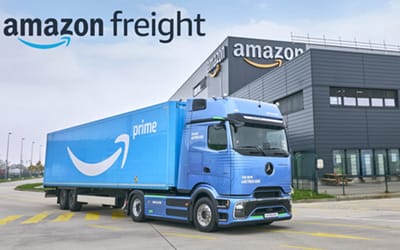
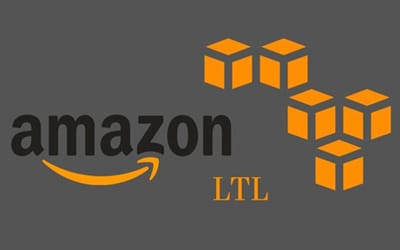
 AI-Powered Routing and Optimisation
AI-Powered Routing and Optimisation

 Financial Implications: Understanding the Economics of Adaptation
Financial Implications: Understanding the Economics of Adaptation



